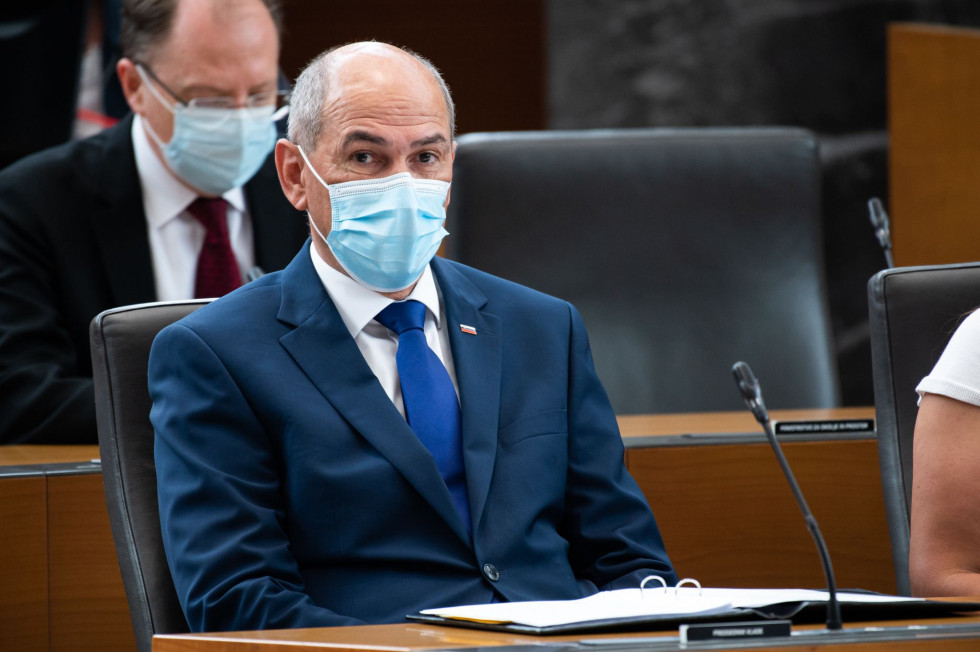Prime Minister Janez Janša takes questions from deputies
- Former Prime Minister Janez Janša (2020 - 2022)

Prime Minister Janez Janša takes questions from deputies | Author Kabinet predsednika vlade
Jerca Korče (LMŠ) asked the Prime Minister about the epidemiological situation following the announcement of the end of the COVID-19 epidemic and future measures. The Prime Minister replied that Slovenia was in the average according to key performance indicators in dealing with the epidemic and reiterated the importance of vaccination. "We are in the European average in terms of vaccination coverage, we can reach 70% by the end of the summer, but if we don't reach 70% by the end of the summer, I can tell you now that we will be in lockdown in the autumn." The Prime Minister went on to say that all countries, not just Slovenia, had increased their public debt as a result of the epidemic. He pointed out that the current Government took office the day after the previous government declared an epidemic and took responsibility for the fact that Slovenia was unprepared for the epidemic and that warehouses with protective equipment were empty. "Despite this, we managed. There were many dead. Do you know where most of these people died? In care homes. You didn't build a single one in 15 years. Not one. You have given more to Metelkova 6 and to NGOs than you have given for long-term care services in care homes in recent years." The Prime Minister concluded his reply to the deputy's question with a call to action: "We are facing another threat, a possible fourth wave. The least we can do now is to stand together and do everything we can to convince people to get vaccinated."
In his reply to the question posed by deputy Jani Prednik regarding the budget deficit, the Prime Minister said that Slovenia was currently 100% within the constitutional and legal criteria in terms of public debt, spending and the country's current fiscal situation. "Point out one EU Member State that has not increased its public debt during the epidemic. Slovenia has improved its credit ratings in international financial markets, we are borrowing at record low interest rates." He went on to say that Slovenia had one of the lowest unemployment rates, even lower than before the crisis. "The more people are employed, the less will be paid in social transfers. The better the economic growth, the more will be created at low tax rates." He added that Slovenia had improved its credit ratings in international financial markets, allowing it to borrow at record low interest rates. "For the first time ever, we have issued a 60-year bond. So far, only a few of the most stable countries in the world have managed to do this. This means that those who lent us the money believe in Slovenia; that it will exist in 60 years, that the money can be paid back, that it will be paid back, and at zero interest rate."
In his answer to the question from deputy Anja Bah Žibert regarding the anticipated new wave of the epidemic, the Prime Minister pointed out that the delta version of the coronavirus was already in Europe and that it was 60% more infectious than the English version, spreading faster. "This has predictable consequences." The Prime Minister said that vaccines were largely the appropriate response to the epidemic. "Those who are fully vaccinated are protected to a large extent, not so much from infection as from the consequences, that is from becoming seriously ill and dying." He added that some countries in the EU were considering making vaccination of adults compulsory. "Some countries are considering compulsory vaccination for certain categories, for example workers in healthcare, critical infrastructure, care homes." The Prime Minister concluded by saying that he welcomed the idea of all deputy groups calling on people to get vaccinated, as this would contribute greatly to making life more normal in the autumn. He stressed that the national media, which are part of the public system and publicly financed, could also make a significant contribution to promoting vaccination. "At the moment, it is mostly up to the media to hold a debate, an honest debate, and to allay people's doubts and fears, because the percentage of unvaccinated people is too high. One has to add to that the quarter of a million people who are too ill to be vaccinated at this time."

